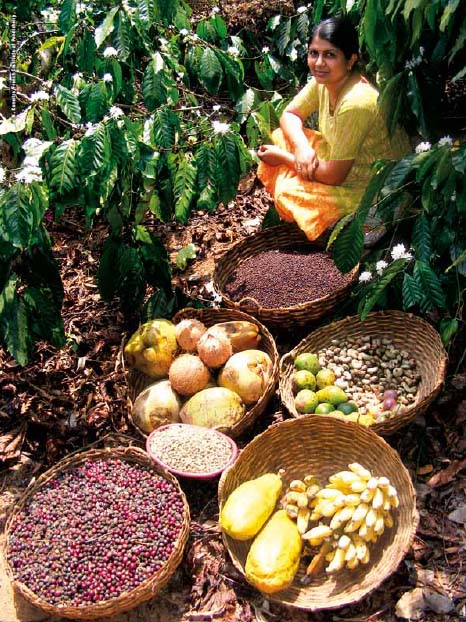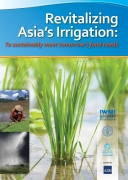Food and Agriculture Organisation (FAO)
Systems at breaking point
Posted on 13 Jan, 2022 10:14 PMThe past decade has seen the advent of several important global policy frameworks including the 2030 Agenda for Sustainable Development, the Paris Agreement on climate change, the Sendai Framework for Disaster Risk Reduction 2015–2030, the Small Island Developing States Accelerated Modalities of Action, the New Urban Agenda and the Addis Ababa Action

Payments for ecosystem services and food security – A report by Food and Agriculture Organisation
Posted on 24 Aug, 2011 06:08 PM Changing climate, loss of native forests, disappearance of biodiversity, water shortages, desertification, the reduction of natural soil fertility — all add to the scenario of a world with increasingly complex environmental challenges.
Changing climate, loss of native forests, disappearance of biodiversity, water shortages, desertification, the reduction of natural soil fertility — all add to the scenario of a world with increasingly complex environmental challenges.
The concept of Payment for Ecosystem Services (PES) has emerged as a challenge to the all-too-prevalent tradition of taking the Earth’s natural resources for granted. PES highlights a global continuum, illustrating the relationship between our lifestyles, the demands associated with our production and consumption patterns, and the effects those demands have on close or distant ecosystems.
The wealth of waste: The economics of wastewater use in agriculture - A report by FAO
Posted on 17 Dec, 2010 07:36 PM This report by the Food and Agriculture Organisation (FAO) deals with the economics of wastewater use in agriculture. It presents an economic framework for the assessment of the use of reclaimed water in agriculture, as part of a comprehensive planning process in water resource allocation strategies to provide for a more economically efficient and sustainable water utilization.
This report by the Food and Agriculture Organisation (FAO) deals with the economics of wastewater use in agriculture. It presents an economic framework for the assessment of the use of reclaimed water in agriculture, as part of a comprehensive planning process in water resource allocation strategies to provide for a more economically efficient and sustainable water utilization.
Resources on water quality, public health and water safety from the World Water Day - UN Water website
Posted on 02 Jul, 2010 01:24 AM The UN-Water website's World Water Day 2010 section, provides access to a range of informative, educational and advocacy material on water.
The UN-Water website's World Water Day 2010 section, provides access to a range of informative, educational and advocacy material on water.
The documents and publications section includes a range of documents related to water quality, drinking water quality and public health, and water safety planning and management including the safe use of wastewater for agriculture and aquaculture.
Revitalizing Asia's Irrigation: To sustainably meet tomorrow's food needs - A report by IWMI and FAO
Posted on 20 Apr, 2010 03:14 PM This document by International Water Management Institute (IWMI) highlights the urgent need for improving irrigation systems to enhance food production to meet the needs of the growing population in Asia, in the context of increasing urbanisation and the challenges posed by climate change.
This document by International Water Management Institute (IWMI) highlights the urgent need for improving irrigation systems to enhance food production to meet the needs of the growing population in Asia, in the context of increasing urbanisation and the challenges posed by climate change.
Experience has shown that improvement in irrigation systems have led to improvement in agricultural growth in Asia in the past where irrigated agriculture still continues to be the heart of rural growth.
However, experts estimate that demand for food and animal feed will double during the next fifty years in Asia. This will require better management of the existing irrigated lands as opening up of new alternatives is constrained by lack of land and water resources.
Water-efficient sugarcane farming in Belgaum, Karnataka
Posted on 17 Feb, 2010 04:28 PMSuresh Desai is a founding member of an Organic Farmers Club in Belgaum District of Karnataka, India. It has 400 members, some of whom are already growing crops organically, while others are in the process of shifting to organic farming.
Since completing his matriculation, Suresh has been caring for the family property of 4.5 hectares, in an area where today sugar cane is primarily grown. For nearly a decade Suresh, as the manager of the farm, followed conventional practices relying on external inputs in the form of chemical fertilizers and pesticides. Just like most of the other farmers near Belgaum, he grew sugar cane, a high water-demanding cash crop, and tobacco.
Development of a framework for good agricultural practices - FAO (2003)
Posted on 29 Aug, 2009 04:14 PMThis report by the Agriculture and Consumer protection Department, Food and Agriculture Organisation of the United Nations (FAO) is divided into the following chapters:
Remediation of arsenic for agriculture sustainability, food security and health in Bangladesh
Posted on 29 Aug, 2009 11:44 AMArsenic (As) in groundwater is a major health concern in Asia and the risks from using shallow tube wells (STWs) for drinking-water are well- known. At present, twelve countries in the Asian region have reported high As levels in part of their groundwater resources.